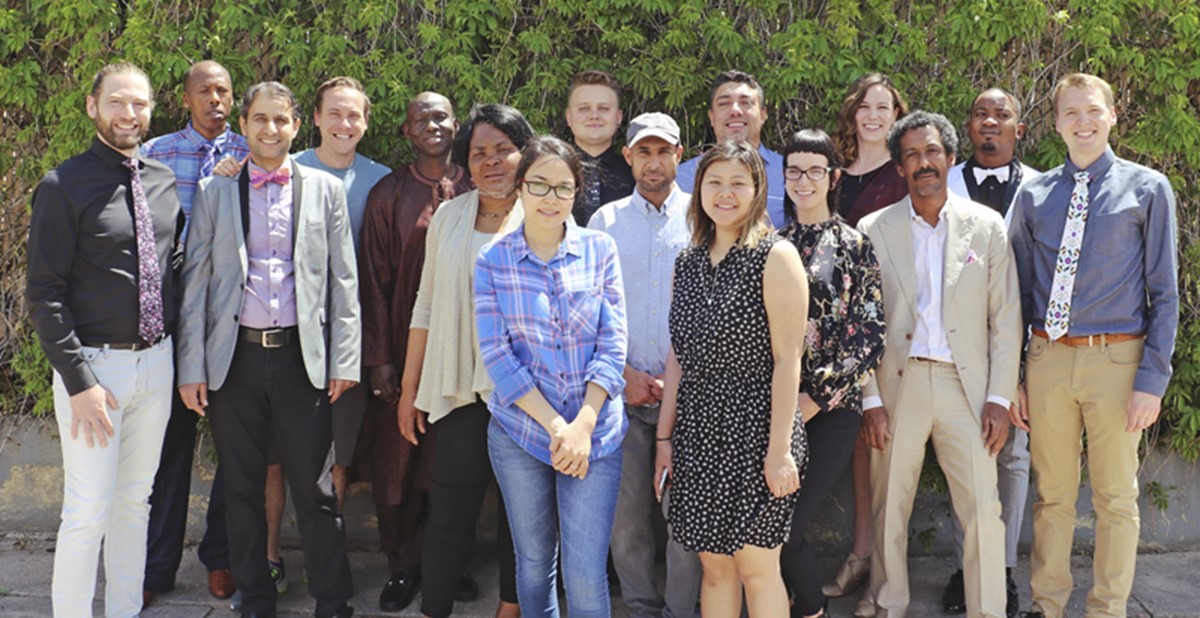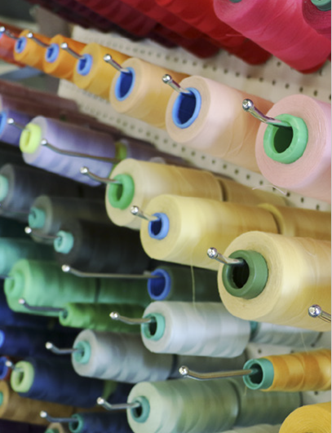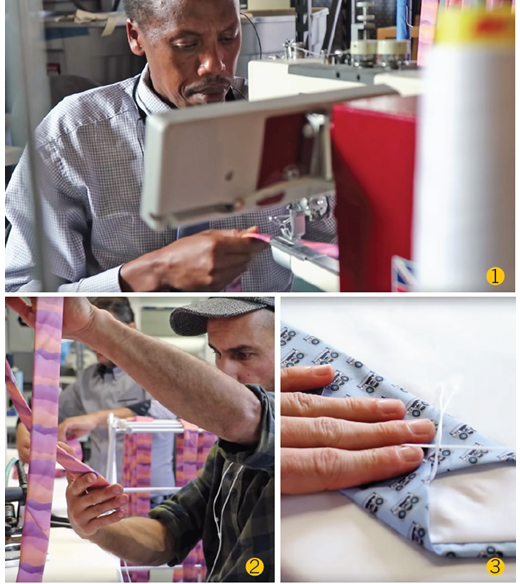Factory Floor: The Ties That Bind Us

Above photo: The founders of Knotty Tie Co. made it their mission to provide gainful employment to resettled refugees.
Ties have made a symbolic mark on men’s fashion, from representing the traditional businessman’s attire to designating social rank, tradition, self-expression and style. But Knotty Tie Co. has added yet another layer to the popular accessory—its role in helping resettled refugees find stable employment.
The Denver, Colorado-based supplier offers myriad custom choices, from traditional neckties to bowties, pocket squares and scarves in infinity, rectangular and square styles. All the products are made domestically using sustainable processes and are customized and handmade on demand in its Denver facility, which is projected to expand in 2020. The blank white, prepared-for-print fabrics are sourced from across the globe, and the materials used to make the neckties, bowties and pocket squares, specifically, are made from recycled plastics to resemble the look and hand of silk. The design potential can be described as infinite, with all colors and patterns imaginable, from an allover flamingo print and constellations of the night sky to quirky cheeseburger patterns and classic art deco. Recently in May 2019, the company launched a distributor-specific website for its products, promo.knottytie.com.
 But with an intent to offer finely finished, made-in-the-USA products to complement all of life’s major events—from college graduations to job interviews, weddings and other milestones—Jeremy Priest, the president, CEO and cofounder of Knotty Tie Co., had another plan for his sundry products. He wanted his company to not only mark life’s greatest moments, but give others the opportunity to experience these moments, too.
But with an intent to offer finely finished, made-in-the-USA products to complement all of life’s major events—from college graduations to job interviews, weddings and other milestones—Jeremy Priest, the president, CEO and cofounder of Knotty Tie Co., had another plan for his sundry products. He wanted his company to not only mark life’s greatest moments, but give others the opportunity to experience these moments, too.
Priest’s journey to cofound Knotty Ties began with a volunteer experience with We Made This, an initiative of the African Community Center that trains women for jobs in sewing, while attending the Metropolitan State University of Denver. Following graduation and time spent in the military, he met cofounder Mark Johnson, and together they launched Knotty Tie Co. with the intent to provide sustainable products that would employ refugees and allow them to use their skills, while learning English. And no matter how much the company grows and progresses, this core mission will remain the same, Priest says.
What inspired you to launch Knotty Tie Co.?
While spending six years in the military from 2002 to 2008, mostly overseas in Africa, Europe and the Middle East, I became aware of the plight of millions of innocent civilians fleeting conflict and destruction. After completing military service, I knew I wanted to help, but didn’t quite know where to start, so I began studying economics and how to help refugees overcome trauma, cultural, linguistic, educational and other barriers that make it very difficult for them to succeed economically upon resettlement to the United States. In college, I was volunteering with refugees who had an abundance of sewing skills but were unable to find quality employment utilizing those skills. Many worked in slaughterhouses or in janitorial work instead of in their trade or were in temporary employment with little to no prospects of improving earnings potential or career growth. Through Knotty Tie Co., we wanted to remove these barriers by developing a for-profit business model where we could utilize refugees’ unique skills that could be at the heart of the company’s competitive advantage—and in exchange, provide dignified employment opportunities with fair wages, generous benefits and flexible schedules to help refugees achieve economic self-sufficiency, care for their families and pursue their dreams in their new homeland.
What are the benefits, in your experience, of offering small-batch, made-in-the-USA products?
Our in-house design, production and fulfillment capabilities allow us to be incredibly flexible to meet the needs of almost any client. Because we make everything in the United States, we can produce and deliver orders quicker (as fast as seven days), with no minimums, no setup fees and in a combination of designs and garments. The efficiencies of owning the whole process also allow us to offer a superior customer experience and service as well as price competitiveness that is shocking to many customers. Ultimately, the customers get what they want and can feel good about what they’ve purchased because of the care we take making the product and the care we demonstrate for the environment.
Can you share with us a story of one of the refugees, that your company has helped?
Living as a Congolese refugee in Rwanda for 18 years, Marc Munyakabuga understood global racial discrimination and injustice on a deeply personal level. Evicted from the Democratic Republic of the Congo in Central Africa, Munyakabuga and his family took refuge in Rwanda, where they worked to create a new home. Munyakabuga attended a year-long program where he learned to sew and used his new talents to provide for his family and teach others. Becoming president of the refugee camp, Munyakabuga managed volunteers, donations and relationships with the Rwandan government. To his surprise, his family was among the first group of refugees from the camp to be granted access to America. While learning a new culture and country was difficult, Munyakabuga sought out jobs where he could use his sewing skills, but to no avail. The only jobs available for recently resettled refugees were unfulfilling, unpredictable and menial. ‘I didn’t think it was possible to find a job doing what I love and using my skills, but I found Knotty Tie, and I am so thankful, every day. It is wonderful to have a job where I can learn English, use my professional skills and provide for my family. I am able to show my children that they have a promising future and can do many things in America.’
What are the most unusual, captivating or standout orders you’ve received?
Organizations are frequently ordering for staff, gifts, events, promotions, donors—but we don’t always get to see the product in action. We have a track record creating apparel for companies that are ringing the bell at the New York Stock Exchange, or other exchanges for their IPOs, like Hubspot and Change Finance, to name a few. It is always exciting to see our products ‘in the wild’ as part of such a special and memorable occasion. Some of the most meaningful work that we do is with organizations and causes that share similar values, whether distributors, universities, philanthropic organizations or companies, like Airbnb, who also care deeply about helping refugees, the environment and responsible production.
How does Knotty Tie Co. incorporate sustainability into its production practices?
Our entire staff is involved in stewarding and improving our impact across all functions of the business, and we frequently establish metrics, measure performance and set goals to reduce or offset power consumption, reduce waste and improve materials and components sourcing. In 2018, 88 percent of the products we made used fabric milled from recycled plastics and 100 percent of our packaging was made from recycled paper and is recyclable. In 2019, we are working on offsetting our power consumption through wind energy programs and developing programs to recycle or upcycle all waste from production. The nature of our process is also much more environmentally-friendly than traditional production methods. Because we produce only what is needed when it is needed, we avoid excessive production, transportation and warehousing of products.


- The first step of the tie-making process begins when the order is received. Ties, and all other products, are made on an on-demand basis, meaning that product production is made to order. The request includes the type of item, the quantity, the anticipated delivery period and the desired print.
- The printed fabric is then cut by a laser to avoid any fraying of the edges throughout the lifespan of the product. Each cut garment is then organized by deadline date, garment type and size, and it is processed in small batches of 25 to 50 units. This way, we can monitor the quality of each batch, reorder prints or re-prioritize jobs if needed.
- Once the sewing and ironing work is complete and quality has been checked, we organize all the elements of a customer’s order back together to ensure colors match across garments, and that everything is accounted for prior to packaging and shipping.

Founding date: January 23, 2013
Principal: Jeremy Priest, cofounder, president and CEO
Number of orders filed per month: 500+
Most popular item: the “knotty width” necktie
––––––––––––––––––––––––––––––––––––––––––––––––––––––––––––––––––––––
Danielle Renda is associate editor of PPB.

